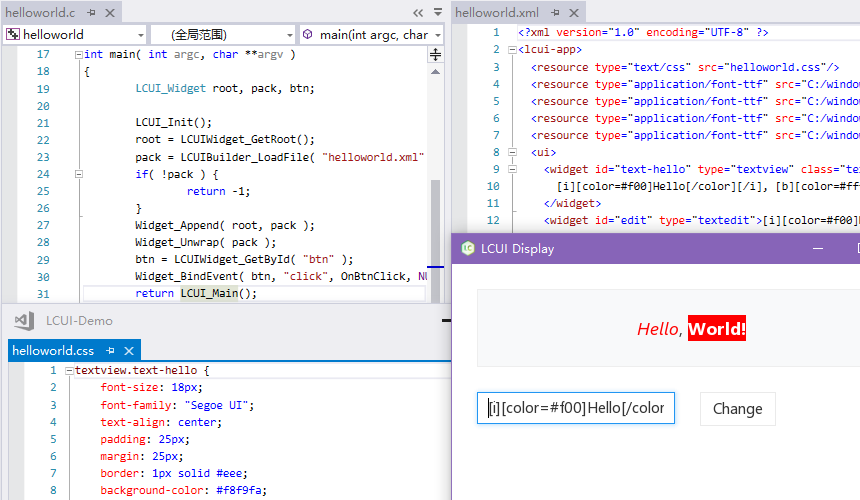A small C library for building user interfaces with C, XML and CSS.
LCUI (LC's UI Library) is a small C library for building user interfaces.

|

|

|

|
Want to know what LCUI can do? You can view the following projects:
LCUI CLI is a command line tool, you need to install Node.js before using it, and then run the following command to quickly experience it:
# Install lcui-cli and lcpkg
npm install -g @lcui/cli lcpkg
# Create an LCUI project named myapp
lcui create myapp
# Go into project directory
cd myapp
# set up the development environment for this project
lcui setup
# Build project
lcui build
# run project
lcui run
lcpkg install
# If you want compile for x64 CPU architecture
lcpkg install --arch x64
# If you want compile for Universal Windows Platform (UWP)
lcpkg install --platform uwp
lcpkg install --arch x64 --platform uwp
config.win32.h.in in the include directory to config.h.build/windows/LCUI.sln file with Visual Studio, and then build LCUI.# Install the dependencies
sudo apt-get install libpng-dev libjpeg-dev libxml2-dev libfreetype6-dev libx11-dev
# Clone this repository
git clone https://github.com/lc-soft/LCUI.git
# Go into the repository
cd LCUI
# Generate automake configure script
./autogen.sh
# Check the build environment and configure automake scripts
./configure
# Build
make
# If you wnat install LCUI
sudo make install
# Go into test directory
cd test
# Run helloworld application
./helloworld
Note: If you want to customize the compiler, compile flags, install location, and other configuration items, read the INSTALL file.
Think LCUI is slow to update? there are many ways to contribute to LCUI.
LCUI has adopted the code of conduct defined by the Contributor Covenant. This document is used across many open source communities, and we think it articulates our values well. For more, see the Code of Conduct.
The English version of the documentation is not available, because the author does not have time to write the English version, please read the files in the test directory and related projects to learn how to use LCUI.
Why develop it?
Is this a browser kernel? Or a development library like Electron that integrates the browser environment?
No, you can think of it as a traditional GUI development library that applied some Web technologies.
What do I need to pay attention to if I'm going to use it?
We recommend that your project meet the following requirements:
Why do I choose the LCUI instead of Electron?
In contrast to fully functional Electron, these features of LCUI, such as small binary file size and low memory usage, are not worth mentioning, except for technical research and share, you have no reason to use LCUI.
Is it the same as writing a web page?
Not exactly, there are the following differences need to be noted:
<script> tag, you can't embed JavaScript or C code like HTML.inline display type.overflow: scroll; style doesn't show scrollbars automatically, you need to create it and specify the container and scroll layer.block instead of inline.overflow: hidden;.How about CSS support?
The following is a list of supported CSS features. Checked is supported (But does not mean full support). Unlisted properties are not supported by default.
@font-face
@keyframes
@media
!important
*
type
#id
.class
:hover
:focus
:active
:first-child
:last-child
[attr="value"]
:not()
:nth-child()
parent > child
a ~ b
::after
::before
The LCUI Project is released under the MIT License.
此处可能存在不合适展示的内容,页面不予展示。您可通过相关编辑功能自查并修改。
如您确认内容无涉及 不当用语 / 纯广告导流 / 暴力 / 低俗色情 / 侵权 / 盗版 / 虚假 / 无价值内容或违法国家有关法律法规的内容,可点击提交进行申诉,我们将尽快为您处理。